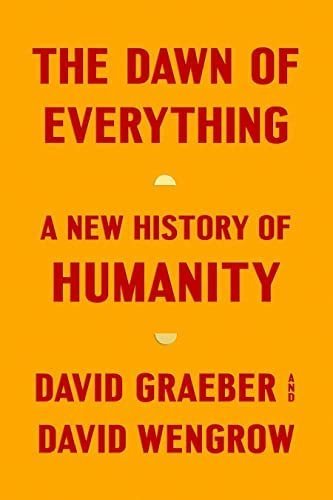Best of 2022
Here are some of our favorite books from 2022. Perhaps some of these books will end up as source texts for future genealogists. If you are making reading resolutions for 2023, we have you covered!
The Dawn of Everything: A New History of Humanity, by David Graeber and David Wengrow, kept me company throughout 2022. I found myself bringing it up in conversation over and over, with scholars and non-academics alike. It’s not only a tight weave of several bold arguments about human nature and history, but also a cornucopia of insights from “prehistoric” archaeology that continually surprised me and challenged assumptions I didn’t even know I held.
-Ryan McDermott
I'm closing 2022 by listening to an audiobook recording of A.S. Byatt's 1990 novel Possession, which tells the story of two English scholars of Victorian poetry who discover the correspondence between two fictional nineteenth-century poets, Randolph Henry Ash and Christabel LaMotte, who are modelled on the real poets Robert and Elizabeth Browning. In this metafictional historical novel, Byatt is deeply interested in how we tell the stories of the past, and how such storytelling is fraught with danger because we can only ever have partial knowledge of history. As Randolph Henry Ash, who adopts historical personae in his own dramatic monologues, describes in one of his letters,
I myself, with the aid of the imagination, have worked a little in that line, have ventriloquized, have lent my voice to, and mixt my life with, those past voices and lives whose resuscitation in our own lives as warnings, as examples, as the life of the past persisting in us, is the business of every thinking man and woman... A lifetime's study will not make accessible to us more than a fragment of our own ancestral past... But that fragment we must thoroughly possess and hand on.
In Byatt's novel this act of passing on the past quickly becomes a hall of mirrors: for if Randolph Henry Ash is a poetic historian, then the reader also has Roland Mitchell, the literary scholar who both wrote a dissertation on Ash's views of history and who is tasked with filling in the gaps of the historical account of Ash's life. And, of course, there is Byatt herself, the supreme historical ventriloquist of the novel, who weaves together fact and fiction, past and present, so deftly and so artfully that it is high entertainment for any genealogist of modernity.
-Kirsten Hall
Jeffrey Barbeau (ed.), The Cambridge Companion to British Romanticism and Religion. Astoundingly, it is only in 2021 that we encounter a text which can claim to be “the first scholarly survey of the connections between literature, religion, and intellectual life during the British Romantic period (1780s–1832).” Jeffrey Barbeau’s excellent edition of The Cambridge Companion to British Romanticism and Religion poses a pair of timely genealogical questions. The first asks what theological and literary traditions flourished beyond Christianity and the “Big Six” of British Romanticism (Blake, Coleridge, Wordsworth, Byron, Shelley, Keats). The second considers the extent to which our own thinking about literature and religion bears the latent influence of this more expansive account of Romanticism.
-Jake Grefenstette
We get a certain story about how human dignity, the right to self-determination, international law, and anti-colonialism became essential principles of modern thought and legal practice. Thanks (supposedly) to early moderns such as Grotius, Locke, and Hobbes, to Enlightenment thinkers, and to post-WWII developments we finally get the recognition of universal human dignity and an international legal theory based on that. But what if there is a different story, an origin to both dignity and law that has largely been neglected? Reading David Lantigua’s Infidels and Empires: Early Modern Spanish Contributions to International Legal Thought, is to encounter a different path for modernity, one that does not take the tortuous route of colonization, forced labor, and land seizures. At the very moment that Spain, and Europe writ large, was launching a cross-Atlantic violation of human dignity, the right to self-determination, and the territorial integrity of polities, Spanish Friars were theorizing precisely why these actions were wrong. Domingo de Soto OP and Francisco de Vitoria OP were both brilliant scholastics building on Thomism to undermine the theoretical and legal foundations of colonization. But perhaps more brilliantly and courageously, Bartolome de las Casas OP examined the rights and the facts and helped found a mode of thinking about international law and human dignity ultimately not based in abstractions or agonistic legal theories but in the meaning of Christ and the Body of Christ. Lantigua’s book deserves to be read for detailing and developing these accounts. It should be read by scholars, Christians, and anti-colonial theorists. Brilliant work!
-Terence Sweeney
https://www.upress.umn.edu/book-division/books/red-and-black
Red and Black: A Chronical of 1830 Stendhal said that writing gave him the same pleasure as reading, except with greater intensity. The French novelist was a model for Tolstoy and Proust, among many others; his best-known work, Le Rouge et le noir (1830), follows the social ascent of a Tartuffe-like French peasant with a photographic memory and a penchant for triangular desire. Raymond Mackenzie's new translation brings out both the comedy and pathos in this founding work of modern fiction.
-Trevor Cribben Merrill
I checked my citation library and I don’t have any books listed there that I’ve read that were published in 2022, but I did want to send along two books that I’ve read reviews for and am really excited about. They’re both by scholars that I admire, are relevant to genealogy and modernity, and I’m excited to read them in full in 2023!
Kimberly Anne Coles, Bad Humor: Race and Religious Essentialism in Early Modern England University of Pennsylvania Press, 2022.
Noémie Ndiaye, Scripts of Blackness: Early Modern Performance Culture and the Making of Race University of Pennsylvania Press, 2022.
-Caro Pirri





